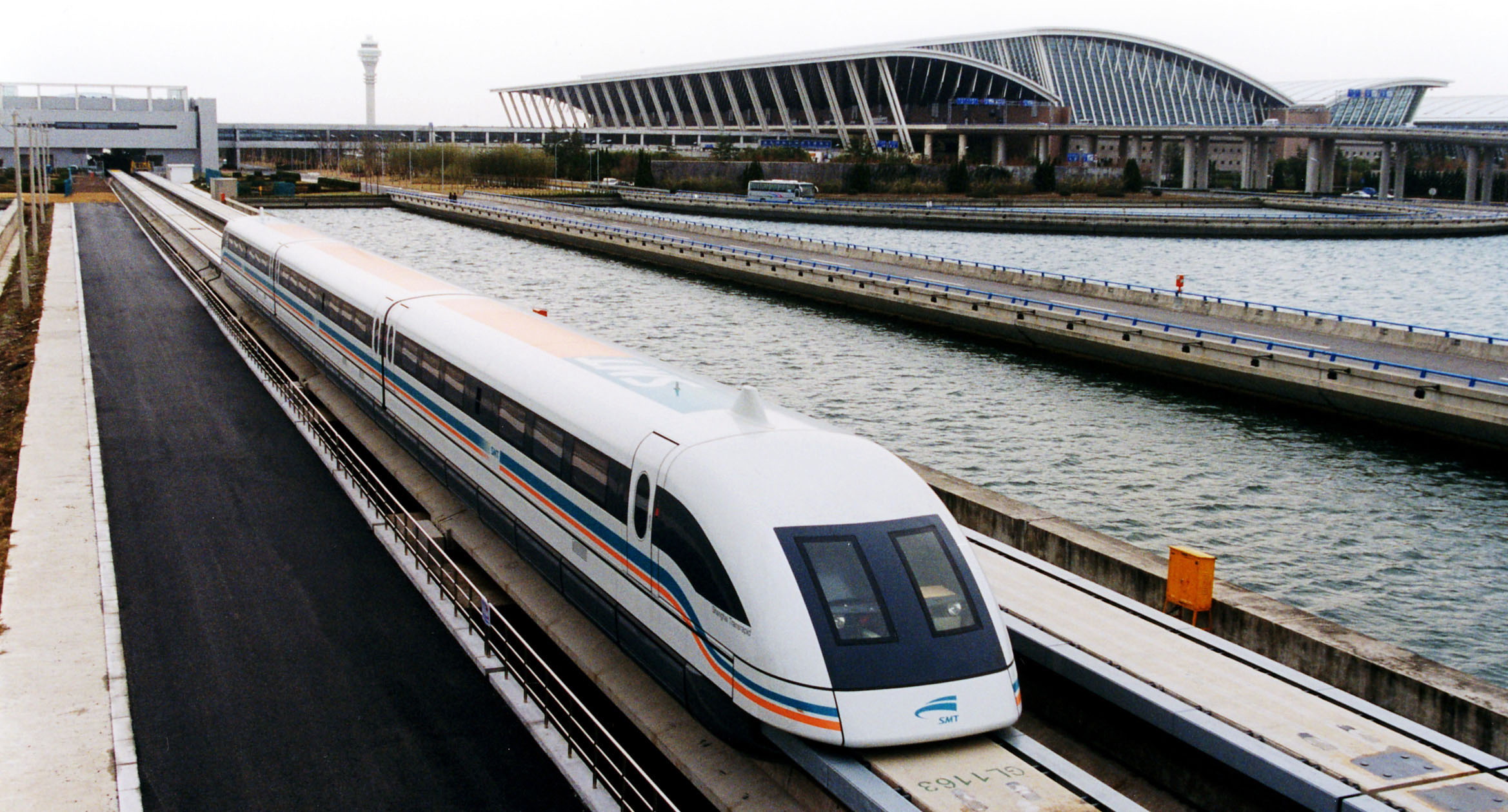 |
| Wikimedia photo of a Maglev train at Pudong airport |
We took the Maglev (magnetic) train to Pudong airport (PVG), a journey of only a few minutes above flooded fields, flooded streets and probably flooded houses. Pudong is right on the coast and from there we could see container ships slowly sailing along, into the Pacific Ocean.
From Shanghai we were taking the British Airways flight to London. The check-in line was very long, but after 20 minutes Chris brightly thought to ask if there was a shorter queue for people with boarding passes who simply wanted to deposit their luggage. There was. After that, we lined up to exit the country, having our exit visas and passport photos checked. Finally, the security checks, and we had reached an attractive Departures lounge with an extraordinary, curved ceiling. So far, so good. I bought a last minute kite for my grandson. We sat down for a breakfast and I looked at the objets d'art on display between the seats: porcelain, glass, jade or bronze vessels, mostly.
We boarded our 'plane on time, all was going well, our Captain waited for his departure clearance and then ... nothing. We sat there looking out of the window at the neighbouring Finnair jet for five hours while China's air traffic controllers apparently allowed just one flight through their airspace to the border per twenty minutes, following their rule of the day. Some of us were wondering who imposes these rules, and why. We'd be next in line after the Finnair, the BA Captain announced, thanking us for our patience. After four hours, that one pulled away, and we thought our wait was nearly over, but no joy. We sat on the tarmac for another hour. Applause from the passengers when we finally began to slide away from our gate, but even then, it was another 20 minutes before we got airborne.
And then the flight itself. Seventeen hours is a terrible long time to sit in one not very comfortable seat. Most of the people around us were Brazilian, speaking Portuguese. To our vicarious horror, when we reached Heathrow at last, it was announced that their BA flight to Rio had been held back so that they could make the connection, as long as they hurried along––straight from one very long haul to another. Poor souls.
Trying to take my mind off things, I watched (mostly before take-off) an Austrian film about a love affair in avalanche country and a documentary about the Afghan national cricket team, entitled Out of the Ashes. While he was able, Chris sent our daughter text messages about the delay to ensure that our hotel room in London would not be lost.
It was frustrating, to say the least, that the Flight Tracker map on flight BA168 was either deliberately disabled or didn't work on our chair-back screens, so we could only guess where we were during that journey. I believe we overflew the Russian steppes, eventually glimpsing snow on some mountains below––were they the Urals, or were we still too far east? Our son-in-law Peter told us afterwards that he had seen the track of our flight crossing Sweden. When we were finally permitted to raise the cabin blinds––it drove us crazy, having to sit for all that length of time in the dark!––with the container ships of Shanghai still fresh in my mind, I was thrilled to see cargo ships below us in the North Sea, approaching either Harwich or Tilbury, and a pleasant British summer evening as we descended slowly over Suffolk and Essex towards Greenwich Park, the Millenium Dome and the familiar old Thames.
A lucky break: we were given priority for our approach to land at Heathrow. At the far end of the journey, Chris and I felt utterly exhausted. The bad news was that we then had to stand for a whole hour in the obligatory sheep pens, because there were too few staff manning the Customs and Immigration desks. There were ironic cheers from the crowd of passengers when the replacement shift deigned to turn up, after which the line began to shuffle forward a little more quickly. We felt sorry enough for ourselves, even sorrier for the families with small children.
Everything comes to an end, sooner or later,
Jeder Strom wird's Meer gewinnen,as Chris sings in Schubert's Winterreise, and finally we were in a London taxi that was taking us to the Park Hotel in Teddington. We checked in, dragged our luggage to our room ... and went for a midnight stroll round the block, past the bistros still doing business in those quiet streets. The air was cool and dry and after forty days in China we were back in an environment we could understand. It felt like coming home.
Jedes Leiden auch sein Grab ...

















































